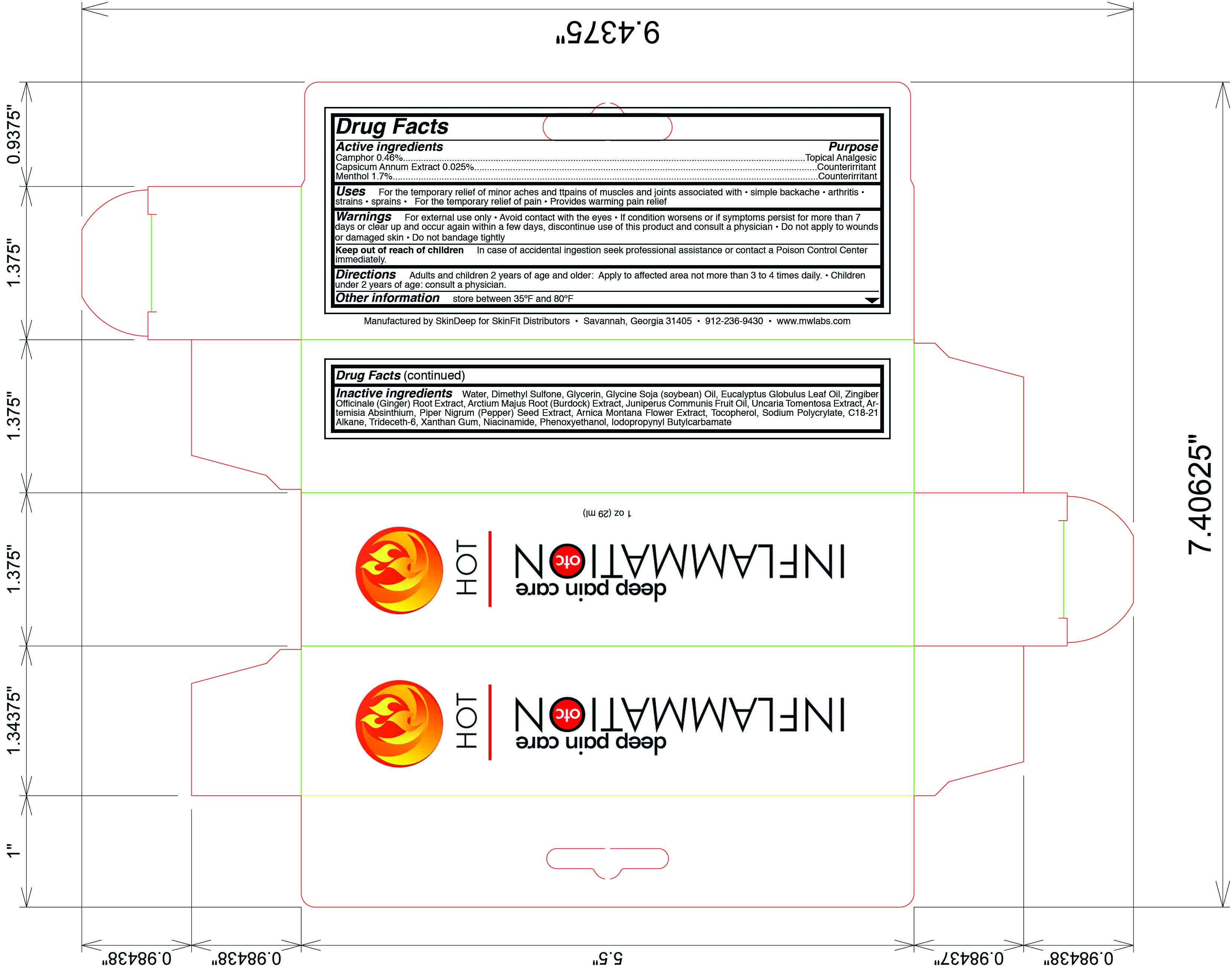Inflammation Otc Deep Pain Care Hot | Camphor, Capsicum, Menthol Lotion while Breastfeeding

What is Inflammation Otc Deep Pain Care Hot | Camphor, Capsicum, Menthol Lotion ?
Brief: Topical Analgesic Counterirritant Counterirritant
Is using Inflammation Otc Deep Pain Care Hot | Camphor, Capsicum, Menthol Lotion safe or dangerous while breastfeeding?

Inflammation Otc Deep Pain Care Hot | Camphor, Capsicum, Menthol Lotion Breastfeeding Analsys
Camphor (natural) while Breastfeeding
UnsafeCAS Number: 76-22-2
Substance which can be extracted under distillation from the Camphor tree bark. Nowadays it is synthesized from the Turpentine. Used with creams and lotions as local anti-inflammatory agent. There is no proof of effectiveness as decongestant or expectorant when used in inhaled preparations, but as a toxic agent. Camphor is a highly lipophilic substance which is well absorbed by whatever via of administration (skin, inhalation, mouth) that crosses easily the cell membrane. Pharmacokinetic data support the likelihood of excretion into breast milk in a significant amount. Camphor has been shown to be toxic at low dose on infants in whom it may cause headache, vomiting, seizures and coma. It should never be administered by mouth. It is not appropriate its use during breastfeeding, and, in whatever case, it should not be applied on the mother's breast, since severe intoxications be occurred in infants after use of small ingested amounts. Be aware of not using it in the nostrils.
Capsicum while Breastfeeding
Low RiskCAS Number: 84625-29-6
Capsaicin is an oleoresin contained in ripe and dry fruits of hot peppers. It is used for seasoning food and as medicine for topical analgesia in the form of creams, gels or patches. A low absorption into plasma (very low levels or undetectable in plasma) and rapid clearance make it highly unlikely the passage of significant amount toward breast milk. Do not apply on the chest or thoroughly clean it off before breastfeeding.
Menthol while Breastfeeding
SafeHerb which is widely used by many cultures. It has been used even for pain relief during pregnancy and colicky pain in fussy babies (without proved data on this). Since it is non toxic at appropriate dose and a tiny excretion into breast milk of active metabolite Menthol, a moderate consumption is believed compatible while breastfeeding. Dessicated leaves and essential oil of the plant that contains Menthol are used. Properties that have been demonstrated and approved indications are: as spasmolytic for Dyspepsia, Irritable Colon and flatulence. It has been used for the treatment of cracked nipple with best results than placebo or Lanolin. Although with no proven effectiveness, it is traditionally used for cough relief, common cold, pain or itching by local application or inhalation. Overdosing of essential oil may be harmful. Do not expose infants to inhalation of products that contain Menthol (irritation of the air way) In case of use on the nipple, do it after feeding the baby and cleanse thoroughly the surface before the next one.
Inflammation Otc Deep Pain Care Hot | Camphor, Capsicum, Menthol Lotion Breastfeeding Analsys - 2
Capsicum while Breastfeeding
CAS Number: 84625-29-6
Cayenne peppers (Capsicum species) contain capsaicin and related compounds which cause the hot, spicy flavor, as well as numerous other components. Capsicum has no specific lactation-related uses and no information is available on the excretion of Capsicum components in breastmilk. Capsicum is "generally recognized as safe" (GRAS) as a food by the U.S. Food and Drug Administration. Oral ingestion can cause gastrointestinal irritation and has caused skin rashes in the breastfed infants of women who eat foods spiced with red peppers.[1] Capsicum may increase the risk of bleeding and should be used cautiously in patients taking anticoagulant or antiplatelet medications. Cross reactions can occur in those allergic to members of the Solanaceae family of plants (e.g., potatoes, tomatoes, paprika, Jimson weed). Capsaicin is used topically for pain. Application of Capsicum or capsaicin to the mother's skin should not affect the infant as long as the infant's skin does not come into direct contact with the areas of skin that have been treated. Do not apply capsaisin cream to the breast.Dietary supplements do not require extensive pre-marketing approval from the U.S. Food and Drug Administration. Manufacturers are responsible to ensure the safety, but do not need to the safety and effectiveness of dietary supplements before they are marketed. Dietary supplements may contain multiple ingredients, and differences are often found between labeled and actual ingredients or their amounts. A manufacturer may contract with an independent organization to verify the quality of a product or its ingredients, but that does certify the safety or effectiveness of a product. Because of the above issues, clinical testing results on one product may not be applicable to other products. More detailed information #about dietary supplements# is available elsewhere on the LactMed Web site.
Menthol while Breastfeeding
Peppermint (Mentha x piperita) contains menthol, menthone, menthyl acetate as major ingredients. Minor ingredients include 1,8-cineole, pulegone, bitter substances, caffeic acid, flavonoids, and tannins. Peppermint is a purported galactogogue; however, no scientifically valid clinical trials support this use.[1] Galactogogues should never replace evaluation and counseling on modifiable factors that affect milk production.[2] Topical peppermint gel and solutions have been studied for the prevention of pain and cracked nipples and areolas in nursing women. The peppermint preparations were more effective than placebo and expressed breastmilk, and about as effective as lanolin,[3][4][5][6] although a meta-analysis concluded that application of nothing or breastmilk may be superior to lanolin, but good studies are lacking.[7] Menthol is excreted into breastmilk in small quantities; the excretion of other components have not been studied. Peppermint is "generally recognized as safe" (GRAS) as a food by the U.S. Food and Drug Administration. Large doses can cause heartburn, nausea and vomiting. Allergic reactions, including headache, have been reported to menthol. If peppermint is used on the nipples, it should be used after nursing and wiped off before the next nursing. Dietary supplements do not require extensive pre-marketing approval from the U.S. Food and Drug Administration. Manufacturers are responsible to ensure the safety, but do not need to the safety and effectiveness of dietary supplements before they are marketed. Dietary supplements may contain multiple ingredients, and differences are often found between labeled and actual ingredients or their amounts. A manufacturer may contract with an independent organization to verify the quality of a product or its ingredients, but that does certify the safety or effectiveness of a product. Because of the above issues, clinical testing results on one product may not be applicable to other products. More detailed information #about dietary supplements# is available elsewhere on the LactMed Web site.
I am nursing mother and I have already used Inflammation Otc Deep Pain Care Hot | Camphor, Capsicum, Menthol Lotion, what should I do?
If you observer abnormal behavior or any other health issue in infant then you should immediately call 911 or contact other contact other emergency service provider in your area otherwise closely monitor the baby and inform your doctor about your Inflammation Otc Deep Pain Care Hot | Camphor, Capsicum, Menthol Lotion usage and time interval of breastfeeding.
My doctor has prescribed me Inflammation Otc Deep Pain Care Hot | Camphor, Capsicum, Menthol Lotion, what should I do?
If your doctor knows that you are breastfeeding mother and still prescribes Inflammation Otc Deep Pain Care Hot | Camphor, Capsicum, Menthol Lotion then there must be good reason for that as Inflammation Otc Deep Pain Care Hot | Camphor, Capsicum, Menthol Lotion is considered unsafe, It usually happens when doctor finds that overall advantage of taking
If I am using Inflammation Otc Deep Pain Care Hot | Camphor, Capsicum, Menthol Lotion, will my baby need extra monitoring?
Yes, Extra monitoring is required if mother is using Inflammation Otc Deep Pain Care Hot | Camphor, Capsicum, Menthol Lotion and breastfeeding as it is considered unsafe for baby.
Who can I talk to if I have questions about usage of Inflammation Otc Deep Pain Care Hot | Camphor, Capsicum, Menthol Lotion in breastfeeding?
US
National Womens Health and Breastfeeding Helpline: 800-994-9662 (TDD 888-220-5446) 9 a.m. and 6 p.m. ET, Monday through Friday
UK
National Breastfeeding Helpline: 0300-100-0212 9.30am to 9.30pm, daily
Association of Breastfeeding Mothers: 0300-330-5453
La Leche League: 0345-120-2918
The Breastfeeding Network supporter line in Bengali and Sylheti: 0300-456-2421
National Childbirth Trust (NCT): 0300-330-0700
Australia
National Breastfeeding Helpline: 1800-686-268 24 hours a day, 7 days a week
Canada
Telehealth Ontario for breastfeeding: 1-866-797-0000 24 hours a day, 7 days a week
